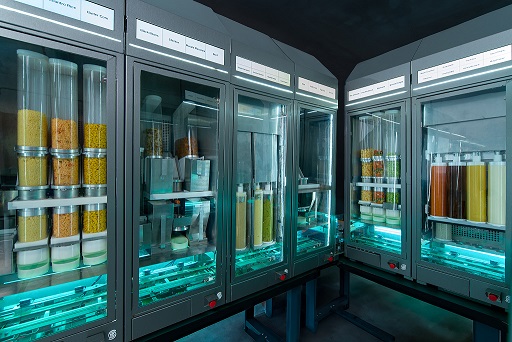Verghese V Joseph –
Niles Toh, a 34-year-old Singaporean who holds a degree in marketing, is the Founder and CEO of Super Tomato, an automation and robotics company that is revolutionising the Food and Beverage (F&B) industry.
Niles’ fascination with robotics began after he started using a Korean automated manicure and pedicure machine during his schooling days.
In 2015, Niles embarked on his entrepreneurial venture, founding FoodRazor and serving as its Founder and Chief Executive Officer till 2021. Under his leadership, FoodRazor experienced remarkable growth, securing funding from angel investors and venture capitalists and achieving dynamic three years revenue growth of over 50% annually.
Additionally, Niles spearheaded FoodRazor’s expansion into international markets, including Australia, New Zealand, Hong Kong, UAE, Ireland, UK, Canada, and the USA, within just three years of its inception.
Building on his entrepreneurial success, Niles founded Super Tomato in 2021 and Monster Builder in 2023, where he currently serves as CEO. With these ventures, Niles continues to push the boundaries of innovation in automation, robotics, and precision manufacturing. Dwelling more on his journey, Niles Toh shares his insights on carving a niche in the demanding F&B industry. Excerpts from the interview:
Q: How has automation been implemented in Singapore’s food and beverage industry to enhance operational efficiency and the customer experience?
A: Many startups and established software providers have addressed this need in terms of software automation, covering areas such as HR management, procurement, point of sale, CRM, and more.
We operate in the field of hardware automation and robotics, which is still in its early stages in the Food and Beverage (F&B) industry. Although hardware automation is already widely used on an industrial level for packing pre-cooked meals and snacks, there has been a growing interest in automation in the F&B industry in recent years due to an extended shortage of manpower, which is expected to persist. As a result, F&B owners are looking for long-term solutions that will enable their businesses to operate with a limited crew while still maintaining high standards. Specifically, automation has been introduced in areas such as wok cooking, grilling meats, making coffee, and more.
In one of our projects, Bowl Builder, our client wanted to improve consistency for customers by ensuring precise portioning of over 36 ingredients. This was done in order to address the labour challenges that many F&B businesses face.
With this machine, businesses can now handle a larger volume of orders quickly, especially during busy periods, which can lead to increased sales. Additionally, customers will experience shorter wait times, which can further encourage them to make purchases. It will help them to expand more effectively in both local and international markets.
Q: What are the main challenges faced by businesses when integrating automation into their operations, and how are these challenges being addressed?
A: F&B is an operational business, so implementing new systems or processes can affect daily operations and require operator training to handle them properly. Downtime is not affordable in this industry.
To minimise disruption, we need to coordinate with management to schedule machine setup during after-hours, which usually means late night or overnight.
In addition to training ground staff, we will prepare drawings and labels which they can easily paste on the machine and wall to help operators handle the machines daily until they become familiar with them.
F&B staff with diverse backgrounds, education, and language skills. Symbols and colours are used for universal understanding when we design the machine.
Aside from gathering the management goal, it’s crucial to have an in-depth understanding of the operational processes on the ground with the ground crew. Small details are often essential to factor in before designing a system that meets management goals and considers ground knowledge and constraints.
Q: How does automation impact the workforce in the food and beverage sector in Singapore, both in terms of job displacement and upskilling opportunities?
A: In Singapore, there is always a high demand for workers in the F&B industry. It is rare to find an F&B owner who claims to have a fully staffed establishment. This is because it is challenging to hire Singaporeans due to the long working hours and the requirement to work on public holidays.
By adopting automation solutions, F&B owners can redesign the operational job scope of their staff to enable them to upskill and take on higher value-added work in operating and maintaining the machines. This means that instead of spending more time in the kitchen doing repetitive work, staff can be reassigned to more customer-facing tasks, such as interacting with customers and focusing on service. Meanwhile, the machines can ensure the consistency of the food quality.

Q: What role do government support and regulation play in facilitating the adoption of automation technologies in the food and beverage industry?
A: The Singapore government agency, ESG, has been proactive in creating awareness and introducing automation solutions to the market, both locally and internationally. For instance, RAS and ESG are organising a trip to the US in May, where they will take a group of F&B owners to visit several companies that have adopted or experimented with automation in their businesses. With more awareness and successful case studies, owners gain knowledge and confidence to explore automation in their respective businesses.
Hardware automation and robotics involve high initial costs since hardware is involved, and as all F&B businesses have different requirements, research and development or customisation are necessary. The Singapore government has several grants, such as the Enterprise Development Grant, which help to lower the initial upfront investment. The Singapore government has been helpful in providing an environment and grants to support automation. We need to build more successful case studies to provide more confidence to owners who are sitting on the fence.
Q: How do consumers perceive and respond to automation in dining experiences in Singapore, and what are the implications for businesses in terms of customer satisfaction and loyalty?
A: It depends on the type of F&B business that the consumer is visiting. In a fine dining restaurant where the experience is expensive, customers expect the service and the chef to manually prepare each dish individually.
Many people consume their daily meals in places like hawker centres, kiosks, and fast-food restaurants, where they look for affordable and quick food. In such cases, customers prioritise getting food that is affordable, tastes the same, and is prepared in the shortest possible time. Whether the food is prepared by automated machines or human beings doesn’t matter as long as they are getting the above-mentioned.
Automation can help ground staff by providing consistent quality and shorter waiting times for customers. This, in turn, can increase customer satisfaction and loyalty.

